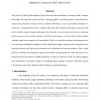Free Online Productivity Tools
i2Speak
i2Symbol
i2OCR
iTex2Img
iWeb2Print
iWeb2Shot
i2Type
iPdf2Split
iPdf2Merge
i2Bopomofo
i2Arabic
i2Style
i2Image
i2PDF
iLatex2Rtf
Sci2ools
MANSCI
2010
2010
Navel Gazing: Academic Inbreeding and Scientific Productivity
The practice of having PhDs employed by the university that trained them, commonly called "academic inbreeding," has long been assumed to have a damaging effect on scholarly practices and achievement. Despite this perception, existing work on academic inbreeding is scarce and mostly descriptive or exploratory. Using data from Mexico, we find evidence that, first, academic inbreeding is associated with lower scholarly output. Second, academically inbred faculty are more centered in their own institution and less open to the rest of the scientific world. This navel gazing is a critical driver of their inferior scientific output when compared with non-inbreds. Third, we reveal that academic inbreeding practices can result from institutional strategies by which inbreds have higher teaching loads and perform more outreach activities to free up time of non-inbreds to be dedicated to the research endeavor. Thus, a small presence of inbreds can benefit the output of non-inbreds and ...
| Added | 29 Jan 2011 |
| Updated | 29 Jan 2011 |
| Type | Journal |
| Year | 2010 |
| Where | MANSCI |
| Authors | Hugo Horta, Francisco M. Veloso, Rócio Grediaga |
Comments (0)

